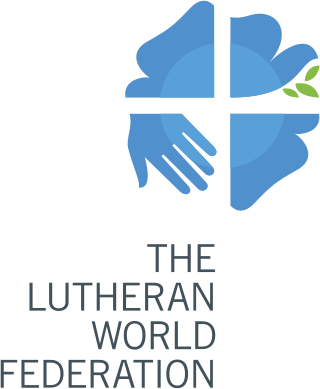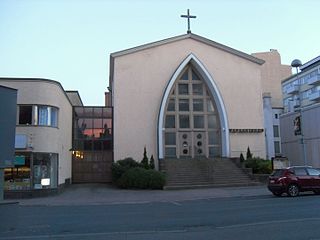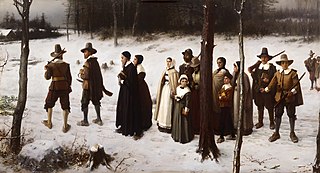Related Research Articles
Evangelicalism, also called evangelical Christianity or evangelical Protestantism, is a worldwide interdenominational movement within Protestant Christianity that emphasizes the centrality of sharing the "good news" of Christianity, being "born again" in which an individual experiences personal conversion, as authoritatively guided by the Bible, God's revelation to humanity. The word evangelic comes from the Greek word for 'good news'.

The Lutheran World Federation is a global communion of national and regional Lutheran denominations headquartered in the Ecumenical Centre in Geneva, Switzerland. The federation was founded in the Swedish city of Lund in the aftermath of the Second World War in 1947 to coordinate the activities of the many differing Lutheran churches. Since 1984, the member churches are in pulpit and altar fellowship, with common doctrine as the basis of membership and mission activity.

A united church, also called a uniting church, is a denomination formed from the merger or other form of church union of two or more different Protestant Christian denominations, a number of which come from separate and distinct denominational orientations or traditions. Multi-denominationalism, or a multi-denominational church or organization, is a congregation or organization that is affiliated with two or more Christian denominations, whether they be part of the same tradition or from separate and distinct traditions.

A free church is any Christian denomination that is intrinsically separate from government. A free church neither defines government policy, nor accept church theology or policy definitions from the government. A free church also does not seek or receive government endorsements or funding to carry out its work. The term is only relevant in countries with established state churches. Notwithstanding that the description "free" has no inherent doctrinal or polity overtones. An individual belonging to a free church is known as a free churchperson or, historically, free churchman.

The Christian Conference of Asia is a regional ecumenical organisation representing 15 National Councils and over 100 denominations (churches) in New Zealand, Australia, Bangladesh, Burma, Cambodia, East Timor, Hong Kong, India, Indonesia, Laos, Japan, Korea, Malaysia, Pakistan, Philippines, Sri Lanka, Taiwan and Thailand.

The term Evangelical Catholic is used in Lutheranism, alongside the terms Augsburg Catholic or Augustana Catholic, with those calling themselves Evangelical Catholic Lutherans or Lutherans of Evangelical Catholic churchmanship stressing the catholicity of historic Lutheranism in liturgy, beliefs, practices, and doctrines. Evangelical Catholics teach that Lutheranism at its core "is deeply and fundamentally catholic". The majority of Evangelical Catholic Lutheran clergy and parishes are members of mainstream Lutheran denominations.

The Church of Christ in Thailand (C.C.T.) is a Protestant Christian association. It is the largest Protestant denomination in Thailand and is considered to be the largest by group of Protestant members in Thailand.

Christianity in Kazakhstan is the second most practiced religion after Islam and one of the major religions of Kazakhstan.

Protestantism in Brazil began in the 19th century and grew in the 20th century. The 2010 Census reported that 22.2% of the Brazilian population was Protestant, while in 2020 the percentage was estimated to have risen to 31% of the population, over 65 million individuals, making it the second largest Protestant population in the Western world.
Protestants in India are a minority and a sub-section of Christians in India and also to a certain extent the Christians in Pakistan before the Partition of India, that adhere to some or all of the doctrines of Protestantism. Protestants in India are a small minority in a predominantly Hindu majority country, but form majorities in the north-eastern states of Meghalaya, Mizoram and Nagaland and significant minorities in Konkan division, Bengal, Kerala and Tamil Nadu, with various communities in east coast and northern states. Protestants today trace their heritage back to the Protestant reformation of the 16th century. There are an estimated 20 million Protestants and 16 million Pentecostals in India.

Protestants in Russia constitute 1–2% of the overall population of the country. Additionally there are around 15.000–20.000 Doukhobors and 40.000 Molokans in Russia, who have similarities to Protestantism. By 2004, there were 4,435 registered Protestant societies representing 21% of all registered religious organizations, which is second place after Eastern Orthodoxy. By contrast in 1992 the Protestants reportedly had 510 organizations in Russia.
Protestants composed less than 1% of the population of Tajikistan in 2020. There is a Lutheran congregation in Dushanbe. There are about 3,000 evangelicals, who mainly are of Russian origin. The Constitution provides for religious freedom. There are Methodist and Seventh-day Adventist congregations in Tajikistan. Many Christians are from South Asia. According to the European Baptist Federation, government officials view the nation's Christians in the same light as militant Muslims.
According to 2020 estimates, Protestants make up 0.04% of the population of Turkmenistan, or about 3% of the Christian community of the country. Other reports suggest that there are 2,000 Protestants in the country, worshiping in 8 churches.

Christianity in Uzbekistan is a minority religion.

Christians, most of whom are ethnic Russians, constitute less than 11% of the population in Turkmenistan; Eastern Orthodoxy in Turkmenistan is the main form of Christianity.

Protestantism is the largest grouping of Christians in the United States, with its combined denominations collectively comprising about 43% of the country's population in 2019. Other estimates suggest that 48.5% of the U.S. population is Protestant. Simultaneously, this corresponds to around 20% of the world's total Protestant population. The U.S. contains the largest Protestant population of any country in the world. Baptists comprise about one-third of American Protestants. The Southern Baptist Convention is the largest single Protestant denomination in the U.S., comprising one-tenth of American Protestants. Twelve of the original Thirteen Colonies were Protestant, with only Maryland having a sizable Catholic population due to Lord Baltimore's religious tolerance.

Christianity is a prevalent religion in Denmark; in January 2023, 72.1% of the population of Denmark were members of the Church of Denmark. According to a survey based on a sample 1,114, 25% of Danes believe Jesus is the son of God, and 18% believe he is the saviour of the world. Aside from Lutheranism, there is a small Catholic minority, as well as small Protestant denominations such as the Baptist Union of Denmark and the Reformed Synod of Denmark.
References
- ↑ The ARDA website, retrieved 2023-08-08
- ↑ Protestantism by country
- 1 2 3 de:Evangelisch-Lutherische Kirche in Usbekistan
- ↑ The World Christian Encyclopedia, Second edition, Volume 1, p. 795